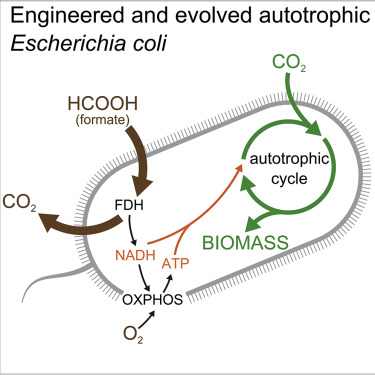Our official English website, www.x-mol.net, welcomes your feedback! (Note: you will need to create a separate account there.)
Conversion of Escherichia coli to Generate All Biomass Carbon from CO2.
Cell ( IF 64.5 ) Pub Date : 2019-11-27 , DOI: 10.1016/j.cell.2019.11.009 Shmuel Gleizer 1 , Roee Ben-Nissan 1 , Yinon M Bar-On 1 , Niv Antonovsky 1 , Elad Noor 1 , Yehudit Zohar 1 , Ghil Jona 2 , Eyal Krieger 1 , Melina Shamshoum 1 , Arren Bar-Even 1 , Ron Milo 1
Cell ( IF 64.5 ) Pub Date : 2019-11-27 , DOI: 10.1016/j.cell.2019.11.009 Shmuel Gleizer 1 , Roee Ben-Nissan 1 , Yinon M Bar-On 1 , Niv Antonovsky 1 , Elad Noor 1 , Yehudit Zohar 1 , Ghil Jona 2 , Eyal Krieger 1 , Melina Shamshoum 1 , Arren Bar-Even 1 , Ron Milo 1
Affiliation

|
The living world is largely divided into autotrophs that convert CO2 into biomass and heterotrophs that consume organic compounds. In spite of widespread interest in renewable energy storage and more sustainable food production, the engineering of industrially relevant heterotrophic model organisms to use CO2 as their sole carbon source has so far remained an outstanding challenge. Here, we report the achievement of this transformation on laboratory timescales. We constructed and evolved Escherichia coli to produce all its biomass carbon from CO2. Reducing power and energy, but not carbon, are supplied via the one-carbon molecule formate, which can be produced electrochemically. Rubisco and phosphoribulokinase were co-expressed with formate dehydrogenase to enable CO2 fixation and reduction via the Calvin-Benson-Bassham cycle. Autotrophic growth was achieved following several months of continuous laboratory evolution in a chemostat under intensifying organic carbon limitation and confirmed via isotopic labeling.
中文翻译:

大肠杆菌转化为二氧化碳产生的所有生物质碳。
生活世界大体上分为将二氧化碳转化为生物质的自养生物和消耗有机化合物的异养生物。尽管人们对可再生能源存储和更可持续的食品生产产生了广泛兴趣,但迄今为止,工业上相关的异养模式生物利用二氧化碳作为唯一碳源的工程设计仍然是一个严峻的挑战。在这里,我们报告了实验室时间尺度上这一转变的成就。我们构建并进化了大肠杆菌,以利用二氧化碳生产其所有的生物质碳。降低功率和能量但不提供碳,而是通过可以通过电化学方式产生的一碳分子甲酸酯提供的。Rubisco和磷酸核糖激酶与甲酸脱氢酶共表达,以通过Calvin-Benson-Bassham循环实现CO2固定和还原。
更新日期:2019-11-28
中文翻译:

大肠杆菌转化为二氧化碳产生的所有生物质碳。
生活世界大体上分为将二氧化碳转化为生物质的自养生物和消耗有机化合物的异养生物。尽管人们对可再生能源存储和更可持续的食品生产产生了广泛兴趣,但迄今为止,工业上相关的异养模式生物利用二氧化碳作为唯一碳源的工程设计仍然是一个严峻的挑战。在这里,我们报告了实验室时间尺度上这一转变的成就。我们构建并进化了大肠杆菌,以利用二氧化碳生产其所有的生物质碳。降低功率和能量但不提供碳,而是通过可以通过电化学方式产生的一碳分子甲酸酯提供的。Rubisco和磷酸核糖激酶与甲酸脱氢酶共表达,以通过Calvin-Benson-Bassham循环实现CO2固定和还原。



























 京公网安备 11010802027423号
京公网安备 11010802027423号